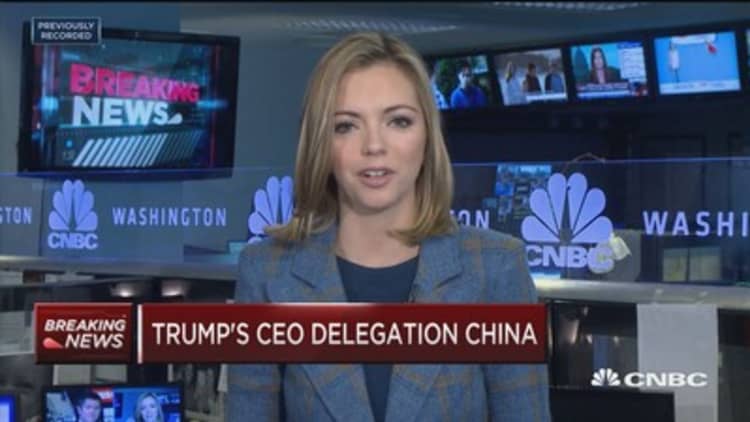
When President Donald Trump lands in China next week, he'll be joined by more than two dozen business titans representing American energy, industrial, financial services and agricultural industries, according to a list obtained by CNBC.
An attendance list submitted to China's Ministry of Foreign Affairs for a state banquet held in honor of Trump's November visit included Goldman Sachs CEO Lloyd Blankfein, Qualcomm CEO Steve Mollenkopf, Cheniere Energy CEO Jack Fusco and Air Products CEO Seifollah Ghasemi. Division heads from Boeing and General Electric were also included.
An application posted by the Department of Commerce in September touted the trade mission as a way to connect with high-level officials, encourage market access and promote investments. Five people familiar with the planning said the White House homed in on companies that could announce "done deals": multibillion-dollar export announcements that would have the effect of chipping away at the U.S. trade deficit with China.
"The Chinese are always willing to play ball with regard to concrete purchases," said Bruce Hirsh, principal at Tailwind Global Strategies and a former official at the Office of the U.S. Trade Representative during the Obama, George W. Bush and Clinton administrations. "The bigger question is whether they're willing to deal with broader trade problems."
It's the broader trade problems that could prove thorny when they arise in bilateral talks.
In briefings with reporters, senior administration officials have said the president will continue to stress the need for China to remove barriers to investment for U.S. companies and rebalance the "colossal" deficit. Trump highlighted the U.S. trade deficit with China — which stood at $347 billion at the end of 2016 — in a Wednesday meeting with Cabinet officials at the White House.
"We have trade deficits with China that are through the roof. They're so big and so bad that it's embarrassing saying what the number is. But you know what the number is," Trump said. "I don't want to embarrass anybody four days before I land in China, but it's horrible."
Traditionally, foreign trips carry quid pro quo announcements where each country can secure a win. Early proposals by China — that were rebuffed by the White House — were said to include broader, long-term access to the financial markets, a follow-up to prior objectives the two countries negotiated that allowed U.S. banks to underwrite bonds and apply for licenses to process payments. As a result, a rough draft of the CEO delegation included a handful of high-octane Wall Street executives, according to five people familiar with the planning.
"It's very ripe for opening," said Stephen A. Orlins, president of the National Committee for United States-China Relations. Orlins said the financial services industry was low-hanging fruit, given the Wall Street background of the Trump administration, and the fact that further access for U.S. banks in capital markets and insurance would end up hastening the maturity of China's markets.
"They'd get a big win from making what appeared to be concessions, but the winners are ultimately Chinese corporates and the Chinese public."
In an Oct. 30 briefing with reporters, China's ambassador to the United States, expressed cautious optimism talks between the world's two largest economies would be mutually beneficial.
"I think the two teams have already spent a lot of time and a lot of energy on" economic and trade cooperation, Ambassador Cui Tiankai said, according to a transcript of a briefing. "I am confident that there will be a significant outcome, or what we call deliverables, on the economic and trade front."
This is the list of attendees:
- Seifollah Ghasemi, chairman, president & CEO, Air Products
- Keith Meyer, president, Alaska Gasline Development Corp. (AGDC)
- Gov. Bill Walker, state of Alaska
- Donald Chen, president, Asia-Pacific, Archer Daniels Midland Co.
- Daniel Revers, managing partner, Arclight Capital Partners LLC
- Mitch Snyder, president & CEO, Bell Helicopter, Textron Inc.
- Kevin McAllister, president and chief executive officer, Boeing Commercial Airplanes, The Boeing Co.
- Jack Fusco, president and chief executive officer, Cheniere Energy Inc.
- Timothy Tangredi, president & CEO, Dais Analytic Corp.
- Frederick Jones, chairman and chief executive officer, Delfin Midstream LLC
- Andrew Liveris, executive chairman, DowDuPont
- Luka Erceg, president & CEO, Drylet LLC
- David Messer, CEO, Freepoint Commodities LLC
- John Rice, president & CEO, GE Global Growth Organization
- Shane Tedjarati, president, High Global Growth, Honeywell
- Vance Hum, president and chief executive officer, I.M. Systems Group Inc.
- Theodore Walker, CEO, Worldwide Property & Casualty, Partner Reinsurance Company of the United States
- Steve Mollenkopf, CEO, Qualcomm Inc.
- Nick Lisi, executive vice president, SAS
- Kevin Smith, CEO, SolarReserve
- Li Zhao, country representative, Stine Seed Co.
- John Garrison, president & CEO, Terex Corp.
- Langtry Meyer, founder & chief operating officer, Texas LNG Brownsville LLC
- Paul Doherty, president and CEO, The Digit Group Inc.
- Gianluca Pettiti, president, Thermo Fisher Scientific China
- Jim Miller, chairman, U.S. Soybean Export Council
- Paul Koenig, CEO, Viroment
- Jose Emeterio Gutierrez Elso, president & CEO, Westinghouse Electric Co. LLC
- Lloyd Blankfein, chief executive officer, Goldman Sachs

